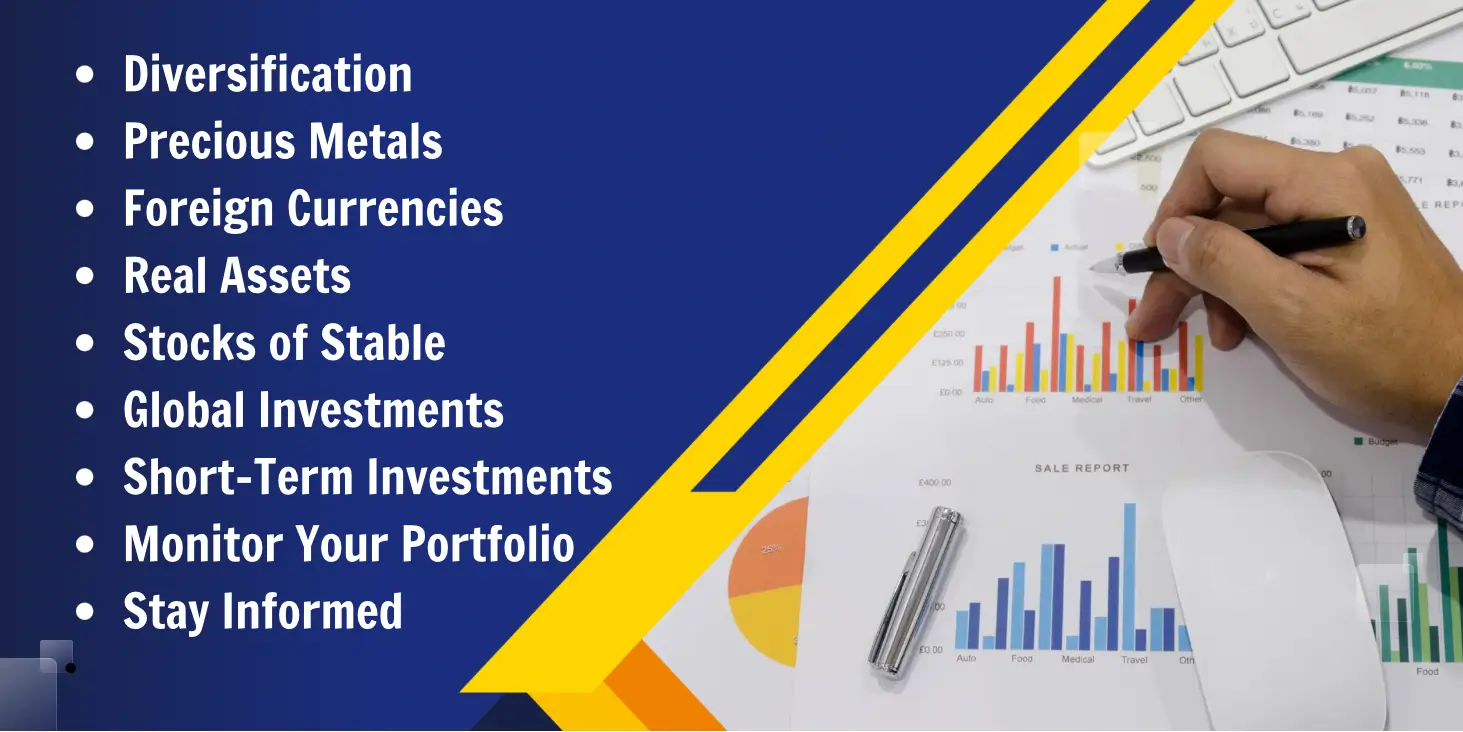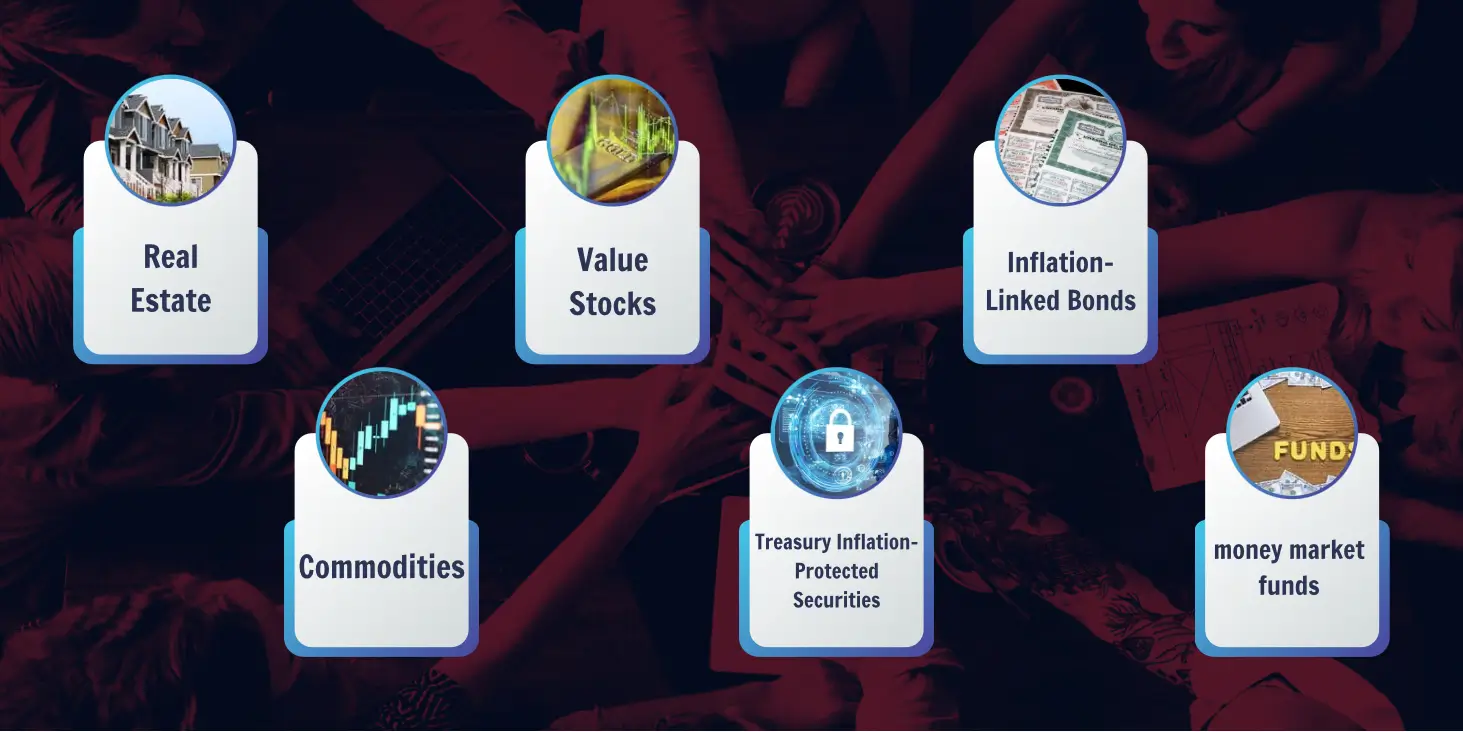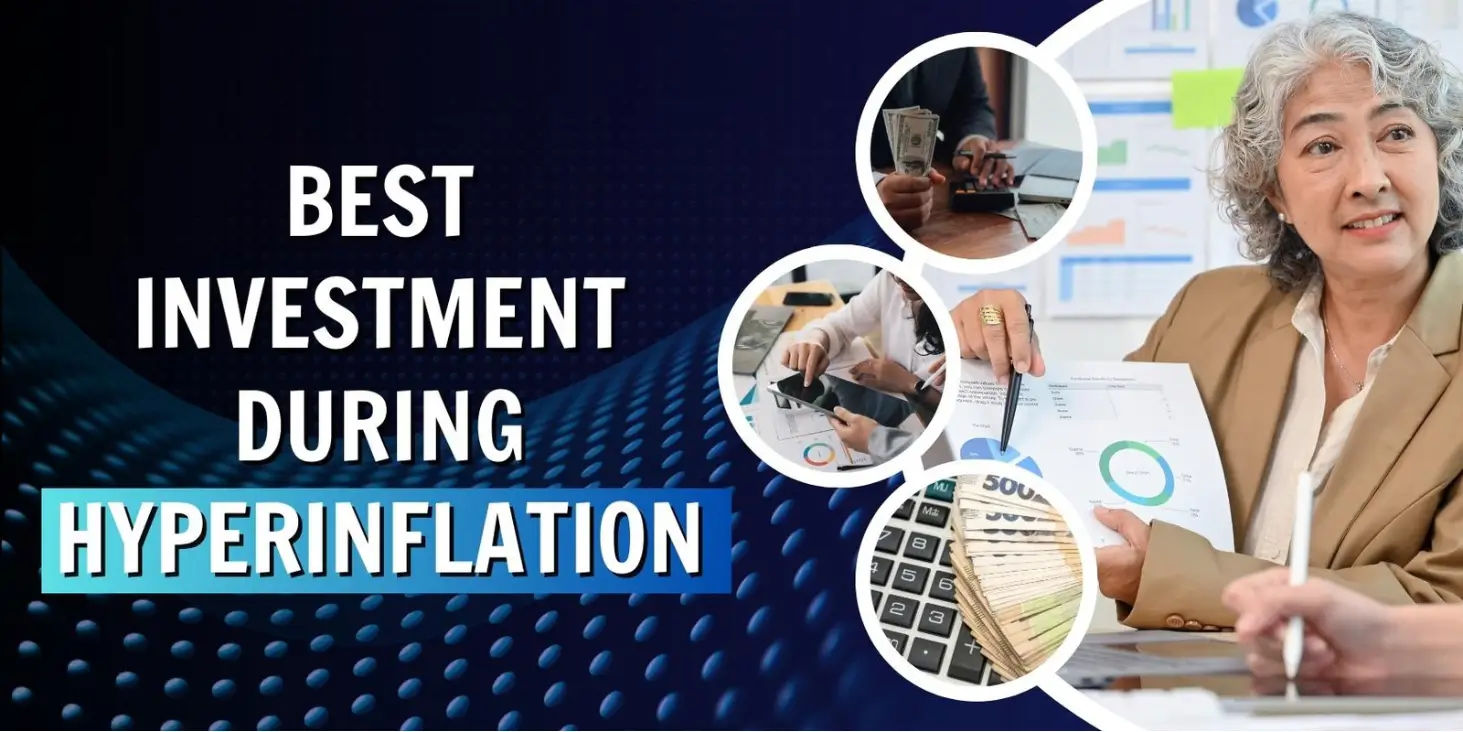Navigating the financial storm of hyperinflation can be a daunting task for any investor. When faced with rapidly rising prices, traditional investment strategies often fall short.
This blog post serves as your guiding compass, revealing the top investment options proven to withstand and even prosper during periods of hyperinflation.
Ready to safeguard your investments against inflation’s eroding effects? Let’s dive in!
Key takeaways
● Invest in Real estate, especially when purchased with a fixed-rate mortgage, can be a stable investment during hyperinflation.
●Commodities like gold and other precious metals have historically acted as a hedge against rising inflation and can be good investments during hyperinflation.
●Value stocks from companies with pricing power are smart investments during periods of high inflation.
●Treasury Inflation-Protected Securities (TIPS) and Inflation-Linked Bonds (I Bonds) offer ways to protect your money and maintain buying power during hyperinflation.
Understanding Hyperinflation
Hyperinflation is a term used to describe a rapid and excessive increase in the overall price of goods and services within an economy.

Definition and Causes
Hyperinflation is a big jump in prices. It happens fast and changes things in the market. This rise in cost can be due to making too much money or poor control of the economy by those in charge.
Wars or other big issues can also cause this change.

Impact on Economy
Hyperinflation hurts the economy. Prices go up fast and everything costs a lot more. People lose faith in the value of money and it becomes worth less with every passing day. This is called loss of purchasing power.
Buying the best inflation hedges like gold or other precious metals can help protect your money from losing its value, as they often increase in value when prices start to rise quickly.
The real estate market is also a good choice during this current inflation because it’s something real and solid that you can hang on to even when the price of everything else goes up too high.
Measuring Hyperinflation
Key indicators are crucial in measuring hyperinflation and determining its impact on the economy.
Key Indicators
Identifying hyperinflation early is crucial to safeguarding investments. Keeping track of key inflation indicators can help investors adjust their strategies accordingly.
Key Indicator | Description |
Consumer Price Index (CPI)
| Monitors the weighted average prices of a basket of consumer goods and services, such as food, medical care, and transportation. A rising CPI indicates rising the effects of inflation. |
Personal Consumption Expenditures Price Index
| Measures the average increase in prices for all domestic personal consumption. It is a more comprehensive inflation protection because it includes a broader range of expenditures. |
Producer Price Index (PPI)
| Measures the average change in selling prices received by domestic producers for their output. A rising PPI can indicate that producers are passing on higher costs to consumers. |
Commodity Prices | Invest in commodities like precious metals like gold and silver or others often increase in value during inflation. Monitor changes in the prices of these assets to gauge inflation trends. |
Remember to constantly monitor these indicators to detect any early signs of hyperinflation.
Protecting Your Investments During Hyperinflation
Implementing strategies to safeguard your assets is crucial during hyperinflation. Discover effective ways to protect and grow your investments in our comprehensive guide.

Strategies to Safeguard Assets
Here are ways to keep your assets safe during inflationary pressure:
Put your money in real estate. This asset often does well when prices rise.
Buy gold and other stuff we can touch and hold. They also tend to do better in a time of higher inflation.
Look at TIPS. The U.S. Treasury ties their interest rate to inflation, so they go up when the inflation rate goes up.
Check out stocks that sell things people always need, like food and soap. These can keep up with inflation too. Because over the years, stocks have proven to be the best hedge against inflation.
Think about leveraged loans and mortgage-backed securities as shields against rising prices.

Ideal Investments During Hyperinflation
During hyperinflation, the best inflation-proof investments include real estate, commodities, stocks and bonds, TIPS, and inflation-linked bonds (I Bonds).

Real Estate
Real estate is considered one of the best investments. It can provide a stable store of value and generate increased rental income as prices rise when inflation is higher.
Real estate also provide a hedge against inflation when purchased with a fixed-rate mortgage, as housing expenses remain the same while the value of other assets may decrease.
Additionally, real estate crowdfunding sites allow investors to access income-generating properties with a low minimum investment requirement, making it more accessible for those looking to invest and prepare for hyperinflation.
Commodities
Commodities, such as gold and other precious metals, can be good investments during hyperinflation. These assets have historically acted as a hedge against inflation, meaning they tend to increase in value when inflation accelerates.
You can also invest in gold focused mutual funds and exchange-traded funds (ETFs) can vastly reduce these costs, but it’s still important to remember that the price of gold is highly volatile, especially over the short term.
Gold, for example, has often been seen as a store of value during times of rising prices. Other commodities like oil and agricultural products may also do well during hyperinflation due to increased demand or scarcity.
However, it’s important to remember that the value of commodities can be volatile and may not always provide consistent investment returns.
Value Stocks
Value stocks, especially those from companies with pricing power, can be a smart investment during periods of inflation rises.
These stocks belong to companies that have the ability to increase prices and maintain profitability even when the overall market is experiencing rising prices.
By investing in value stocks, you are positioning yourself for long-term gains as they tend to outperform other types of investments during inflationary periods.
Remember that it’s important to look for companies with low capital needs and strong fundamentals when considering value stocks as an investment strategy to combat inflation.
Treasury Inflation-Protected Securities (TIPS)
TIPS are a type of inflation investment that can help protect your money during inflation. You can invest in TIPS which has variable interest rates that adjust with the inflation rate, allowing your investment to keep pace with rising prices.
They work similarly to I Bonds, which also provide interest adjustments based on inflation. In 2022, I Bonds are considered an excellent strategy for investing during times of inflation.
Both TIPS and I Bonds earn interest based on a fixed rate and the prevailing inflation rate, making them valuable tools for preserving purchasing power in an inflationary environment.

Inflation-Linked Bonds (I Bonds)
Inflation-linked bonds, also known as I Bonds, are considered ideal investments during hyperinflation. These bonds offer variable interest rates that are tied to the inflation rate.
This means that when inflation surges, the interest rate on the bond increases as well. Investing in I Bonds can help preserve portfolio value and maintain buying power during inflation.
They act as a valuable inflation hedge, ensuring that your investments keep up with rising prices. Treasury Inflation-Protected Securities (TIPS) are another type of inflation-linked bond that can offer similar benefits during periods of hyperinflation.
Invest your money in money market funds.
During inflationary periods, another popular way to invest wisely is in a money market account (MMA).
Here are two examples of why this is so:
Money market accounts interest rates fluctuate in lockstep with interest rates, and they automatically adjust upward as interest rates rise. There’s no need to seek out higher-yielding cash investments.
Because the money market fixed interest rate rises in tandem with the general market, you will avoid the market value loss that plagues fixed-rate investments during times of inflation.
When inflation strikes, money market funds are interest-bearing investments that should hold your cash.
Pros and Cons of Investing During Hyperinflation
Investing during hyperinflation can bring both significant opportunities and potential challenges. Here are some of the key pros and cons to consider:
- Hyperinflation can present opportunities to reexamine your portfolio, allowing for strategic investments that outpace inflation in the long run.
- Real estate, which typically sees its greatest price appreciation during periods of high inflation, can be a strong investment during hyperinflation.
- Value stocks often perform better than growth stocks during hyperinflation, providing investment opportunities.
- Commodities like gold and precious metals can serve as safe-haven assets and tend to rise in price during hyperinflation.
- Treasury Inflation-Protected Securities (TIPS) and I-bonds offer inflation adjustments and protect against purchasing power erosion.
- Hyperinflation can lead to significant economic instability, which can increase the likelihood of investment losses.
- Real estate, while typically a good investment during hyperinflation, can be subject to market volatility and potential devaluation.
- Investors in growth stocks may see their investments decline in value during periods of hyperinflation.
- While commodities can serve as inflation hedges, they may not provide sufficient returns to offset the impact of inflation on other assets.
- The return on TIPS and I-bonds may not keep pace with the rate of hyperinflation, leading to a reduction in real returns.
Investments to Avoid During Hyperinflation
During hyperinflation, it is important to avoid certain investments that may not hold up well in such economic conditions. Here are some investments to avoid:
Retail, technology, and durable goods investments: These sectors tend to struggle during hyperinflation as consumer spending decreases.
Stock market volatility and impact bond funds: These investments can be risky during hyperinflation due to price fluctuations and potential losses.
Leveraged loans and mortgage-backed securities: While they can act as inflation hedges, these investments carry significant risks during uncertain economic times.
Cash or liquid assets: Although cash provides security, it loses its purchasing power rapidly during hyperinflation.
Concentrated portfolios: Investing heavily in a single company or sector increases the risk of loss if that particular investment falters.
Long-term fixed-income investments: With rising interest rates during hyperinflation, these bonds may lose value over time.
High dividend stocks: Dividends may decrease or even be eliminated during hyperinflation as companies struggle to maintain their financial stability.

Conclusion
In conclusion, during the cases of hyperinflation, it’s important to focus on investments that can protect and preserve your wealth, particularly for those on a fixed income.
Real estate with rental income, gold, and other precious metals, inflation-indexed bonds like TIPS, and stocks in everyday products and services like consumer staples can be good options.
It’s also crucial to diversify your portfolio and seek professional investment advice to navigate these challenging times effectively. By taking strategic steps, you can safeguard your investments and maintain purchasing power in the face of rising prices.
FAQs
Investing in diversified index funds like the S&P 500 can help you combat the average U.S. inflation rate, thanks to compounding returns.
Yes, such assets are often connected to the gold market and gold mining companies which tend to perform well during periods of high inflation periods.
REITs invest in all types of real estate assets, such as single-family homes, retail properties, and industrial properties that may provide regular dividends for income investors.
Definitely! A diversified portfolio of stocks combined with other options like S&P 500 exchange-traded funds or Environmental, Social, and Governance (ESG) funds keeps your financial future secure despite varying market conditions.
Series I savings bonds can keep up with both inflation and deflation because their value changes based on current rates set by the Federal Reserve.
You might consider floating-rate bonds or even investing in physical assets like houses; these tend not to lose much value over time, unlike deposits at banks experiencing negative interest rates.
During periods of high inflation, it’s generally best to avoid keeping too much money in low-interest savings accounts or holding onto cash, as the purchasing power of your funds may decline. Holding onto cash during inflation can result in a loss of real value over time, so it’s important to explore alternative investments that offer better protection against the eroding effects of rising prices.








